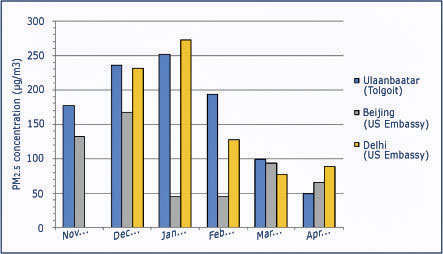
I can’t even breathe in my own apartment!” I exclaimed one January evening at home as my lungs were aching from the outdoor air pollution that was coming inside through closed doors and windows. In Ulaanbaatar astounding concentrations of air pollutants have become normal in the winter season due to coal burning, yet this city receives less media attention compared to New Delhi, India or Beijing, China.
Figure 1 shows a comparison of monthly average concentrations of one type of air pollutant, particulate matter of 2.5 micrometers or less in size (PM2.5), for November 2015 through April 2016 in the aforementioned cities. It can be seen there that PM2.5 concentrations are comparable between all three cities and even Beijing had much lower PM2.5 concentrations in January and February than the two other cities. All three cities have annual PM2.5 averages well above the World Health Organization’s (WHO) guideline of 10 µg/m3. This seems to suggest that air pollution is winning the battle in these cities and, I must add, unfortunately in many other cities in the developing world as well.
One might think, “There’s nothing I can do. I am not the one burning the coal.” But the fact is that residents of these cities had better do something because science from around the world shows that air pollution, especially PM2.5, exerts very harmful effects on the respiratory, cardiovascular, and reproductive systems!
There are four simple steps to take in order to protect oneself against air pollution.
1. Do not spend much time outside when the air pollution is severe.
2. Wear an air pollution mask when outside. All masks rated as N, R or P 95, 99, or 100 and P or FFP 2 or 3 filter between 94-99.97% of airborne particles depending on the rating. Masks must be used carefully because if they do not fit tightly, they will have little effect. Unfortunately, these masks are not available for children, so their time outdoors in pollution should be extremely limited.
3. Use a HEPA filter inside your home. HEPA filters trap and immobilize small particles from the air.
4. Keep doors and windows closed and make sure they are sealed tight. Opening the door or windows or having poor sealing invites the outdoor air pollution inside.
Several JCSers used masks and HEPA filters this past winter. They were all pleased with the positive effects on their health. Let’s get even more people to join us in the fight against the effects of air pollution! You can buy masks and HEPA filters locally from the American Center for Mongolian Studies. Contact: telephone (+976) 7711 0486; email: info@mongoliacenter.org

Figure 1. Monthly average PM2.5 concentrations in three cities (monitoring site in parentheses). Note that no data was available for Delhi for November 2015. Raw data used from https://openaq.org/#/sources.